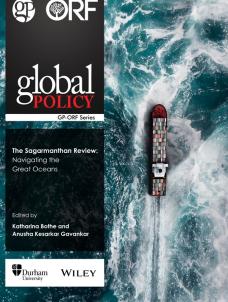
With over 90 percent of global trade reliant on sea routes, maritime governance is critical to secure supply chains, ensure equitable resource access, and foster economic resilience. The maritime domain is also witnessing renewed geopolitical competition even as it offers a variety of new investment opportunities. These are implicating and, in turn, are shaped by both state and non-state actors seeking to navigate an evolving maritime landscape.
This compendium, edited by Katharina Bothe and Anusha Kesarkar Gavankar, offers well-researched analyses and actionable recommendations to shape maritime strategies aligned with economic, social, and environmental goals. Organised into four sections, the first part explores ways to enhance global maritime connectivity through multimodal transport corridors, optimised trade networks, and smart infrastructure investments. The second section focuses on fostering strategic partnerships between India, the Global South, and other regions to strengthen regional cooperation. The third section highlights sustainability imperatives, such as climate change-driven maritime routes, decarbonisation, AI-powered maritime efficiencies, and biodiversity conservation. The final section underscores the importance of people-centric policies to build resilience and adaptability in the face of emerging ocean challenges.
To download the free e-book for popular readers please see below. For a PDF version please see here.
CONTENTS
Foreword
Introduction
Section I: New Frontiers: Connectivity, Infrastructure, and Development in a Changing World
Maritime Partnerships in an Era of Turbulence - Bruce Jones
The EU and India: Common Challenges and Opportunities in Port Development - Tomasz Łukaszuk
Furthering the Partnership Between the Gulf States and India in Maritime Security - Ashraf Keshk
Leveraging Learnings from Panama’s Canal Expansion and Port Development for India’s Coastal Policy - Peter Chatlani
Advancing the Blue Economy in the Arctic -Mads Qvist Frederiksen
Smart Ports, Smarter Trade - Erin Watson
Section II: Blue Growth: Partnerships for Progress
The Promise of Blue Growth - Nadeem Nazurally
The Need to Go Green: Promoting the Blue Economy in Asia - Juita Mohamad
A Plea for the South Blue - Teenah Jutton
Towards a Maritime Circular Economy with an India-EU Partnership - Raimund Bleischwitz and Rüya Perincek
Blue Triple-Use: Unlocking Portugal–India Geoeconomic Synergies - Ruben Eiras
Section III: Green and Blue: Sustainability, Technology, and Innovation
Emerging Challenges in Achieving Environmental Sustainability in Shipping: Focus on India - Ahmed Hussein Selim
Towards Sustainable Shipping: Navigating the Future - Nancy Karigithu
Challenges and Opportunities for Sustainable Development in the Marine Transport Sector - Linda Etta
Disrupting Siloes: Why an Integrated Sustainability Framework is Imperative for Greener Shipping and the Blue Economy - Ayla Bajwa
The Path to Decarbonising the Maritime Industry - Nwabisa Matoti
Advancing Sustainable Circularity in Ship Recycling: A Pathway to Occupational Health and a Green Transition - Paritosh Deshpande and Yogindra Samant
Maritime Technology and Innovation: Charting the Future - Tanuja Kaushik and Rahul Akolkar
Inland Shipping in the Netherlands: On the Way to Zero Emission - Nicole van Spronsen
Section IV: Coasts and Communities: Maritime Governance and Social Impact
The Big Dhow: Decarbonising Shipping - Mohamed Nasheed
Shaping an Inclusive Blue Future: Maritime Governance and Coastal Communities - Malshini Senaratne
Building Resilient Coastal Communities: Governance, Climate Action, and Inclusive Growth - Senthilkumaran Krishnan
Coastal Communities and Ocean Governance: A Quest for Meaningful Public Participation - Vishal Surbun
Sustainable Port Development: Balancing Economic Growth and Social Responsibility - Ishita Sharma
Towards an Inclusive Blue Economy: Indigenous Knowledge and Community-Led Pathways - Anusha Kesarkar Gavankar and Katharina Bothe